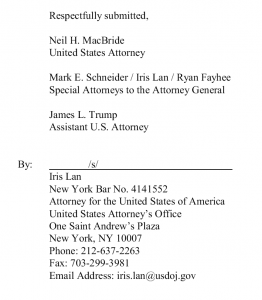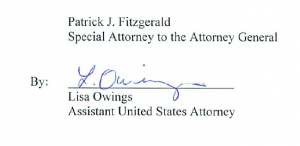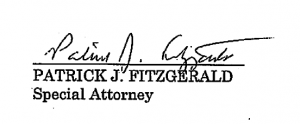PSA: Don’t Misunderstand the Function of a Mueller Report
About a million people have asked me to weigh in on this story, which relies on unnamed defense attorneys (!! — remember that its author, Darren Samuelson, was among those citing Rudy Giuliani’s FUD in the wake of the Paul Manafort plea) and named former prosecutors, warning that people may be disappointed by the Mueller “report.”
President Donald Trump’s critics have spent the past 17 months anticipating what some expect will be among the most thrilling events of their lives: special counsel Robert Mueller’s final report on Russian 2016 election interference.
They may be in for a disappointment.
That’s the word POLITICO got from defense lawyers working on the Russia probe and more than 15 former government officials with investigation experience spanning Watergate to the 2016 election case. The public, they say, shouldn’t expect a comprehensive and presidency-wrecking account of Kremlin meddling and alleged obstruction of justice by Trump — not to mention an explanation of the myriad subplots that have bedeviled lawmakers, journalists and amateur Mueller sleuths.
Perhaps most unsatisfying: Mueller’s findings may never even see the light of day.
The article then goes on to cite a range of impressive experts, though it quotes zero of the defense attorneys, not even anonymously, except in linking back to Rudy warning that the White House would try to block the public release of any report by invoking executive privilege.
Without having first laid out what Samuelson imagines people expect from the report or even what he himself thinks, the piece’s quotes lay out the assumptions of his sources. “He won’t be a good witness,” says Paul Rosenzweig, suggesting he imagines Congress will invite Mueller to testify about his report to understand more about it. Mary McCord, who knows a bit about the investigation having overseen parts of it when she was still acting NSD head, said “It will probably be detailed because this material is detailed, but I don’t know that it will all be made public,” which seems to suggest it will collect dust at DOJ. Paul McNulty, who worked with Mueller in the Bush Administration, acknowledges that Mueller, “knows there are a lot of questions he needs to address for the sake of trying to satisfy a wide variety of interests and expectations.” All those quotes may be true and still irrelevant to what might happen with the Mueller report.
Later in his piece, Samuelson does lay out his assumptions (this time citing none of his impressive sources). Samuelson posits, for example, that, “it will be up to DOJ leaders to make the politically turbo-charged decision of whether to make Mueller’s report public.” He claims Democrats hope to win a majority and with it “subpoena power to pry as much information as possible from the special counsel’s office.” In those comments, Samuelson betrays his own assumptions, assumptions which may not be correct.
Start with this. Even though Samuelson has covered this investigation closely, he somehow missed the speaking indictments covering Russian actions, to say nothing of the 38 pages of exhibits on how Paul Mananfort runs a campaign accompanying the plea deal of Trump’s former campaign manager. It appears he has missed the signs that Mueller — if he has an opportunity — will not be using his mandated report to do his talking.
He’ll use indictments.
Which is probably something you don’t learn listening to defense attorneys who won’t go on the record. But you might learn if you consider what Patrick Fitzgerald has to say. Like McNulty, Fitz also worked closely with Mueller, not just during the four years he served as special counsel investigating the CIA leak case, but during the almost 11 years when Fitz was US Attorney in Chicago and Mueller was FBI Director. Also, while he’s not a defense attorney in the Mueller case, he is representing a key witness, Jim Comey, in it and had a partner, Greg Craig, investigated by it. Fitz basically says that the Scooter Libby trial revealed “a fair amount about what we did.”
Patrick Fitzgerald, the independent counsel in the Plame investigation, was under no obligation to write a report because of the specific guidelines behind his appointment. Testifying before Congress as his probe was ending, Fitzgerald defended the approach by noting that grand jury witnesses expect secrecy when they testify. He also noted that a 2007 public trial involving I. Lewis “Scooter” Libby, a former top aide to Vice President Dick Cheney convicted for perjury, had revealed much of the investigation’s details.
“I think people learned a fair amount about what we did,” Fitzgerald said. “They didn’t learn everything. But if you’re talking about a public report, that was not provided for, and I actually believe and I’ve said it before, I think that’s appropriate.”
Fitz is right. He revealed a lot in that trial, having fought hard to be able to get much of it cleared by the spooks to be publicly released. He revealed enough that, had the Democratically-controlled Congress seen fit in 2007, they could have conducted investigations into the impropriety of things constitutional officer Dick Cheney did in pushing the release of Valerie Plame’s identity. In a key hearing, Joe Wilson actually pulled any punches directed at Cheney. It is my belief, having been present at some key events in this period, that had a witness instead laid out all the evidence implicating Cheney, Congress may well have taken the evidence Fitz released in the trial and used it to conduct further investigation.
No one will have to make that case about Trump to Democrats in the wake of a Mueller investigation, I imagine.
I’ve got a piece coming out next week that lays out what role I think the vaunted Mueller report really plays, because I think it does play a role, a role that Samuelson doesn’t even consider.
But for now, I’ll point to Fitz comments as a way to say that, even drawing as he does on a great number of experts about how such investigations have worked in the past, Samuelson is not drawing the correct lessons. The first of which is that Mueller would prefer to lay out his “report” in trial exhibits.
As I disclosed July, I provided information to the FBI on issues related to the Mueller investigation, so I’m going to include disclosure statements on Mueller investigation posts from here on out. I will include the disclosure whether or not the stuff I shared with the FBI pertains to the subject of the post.




